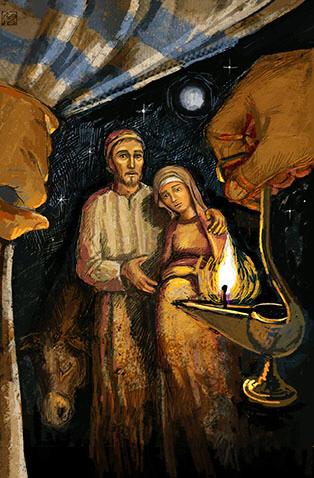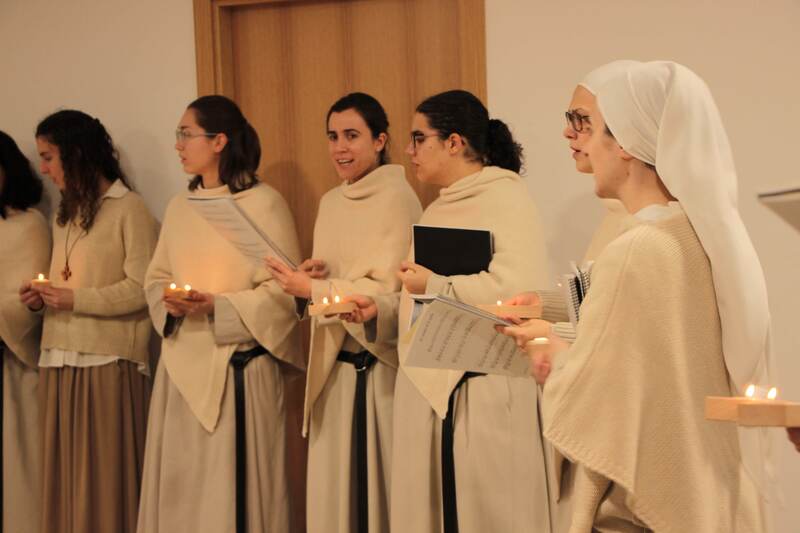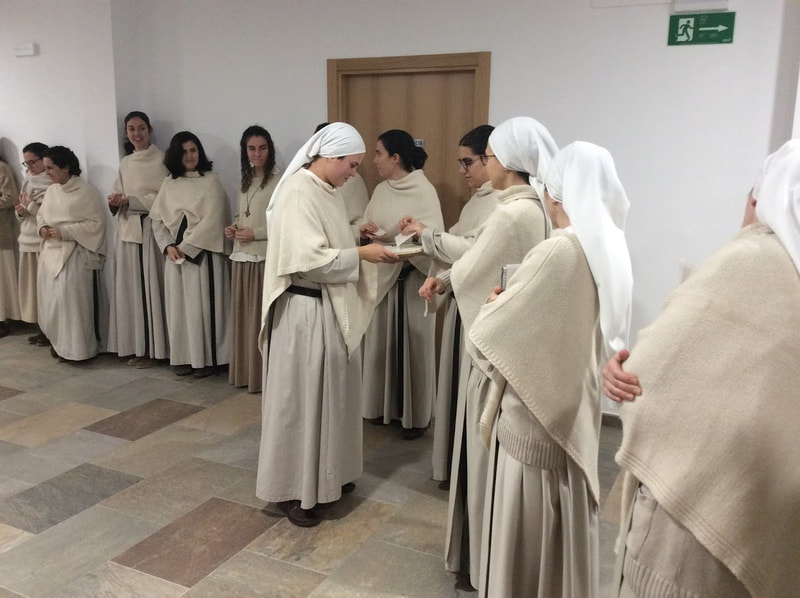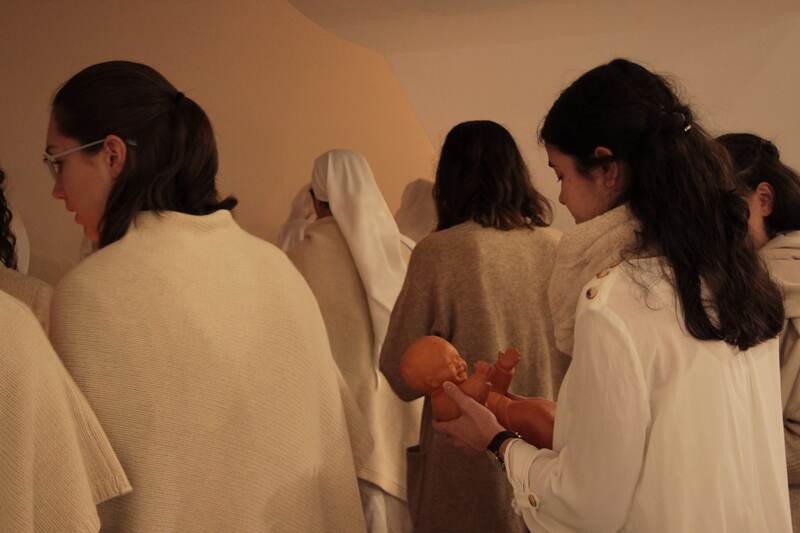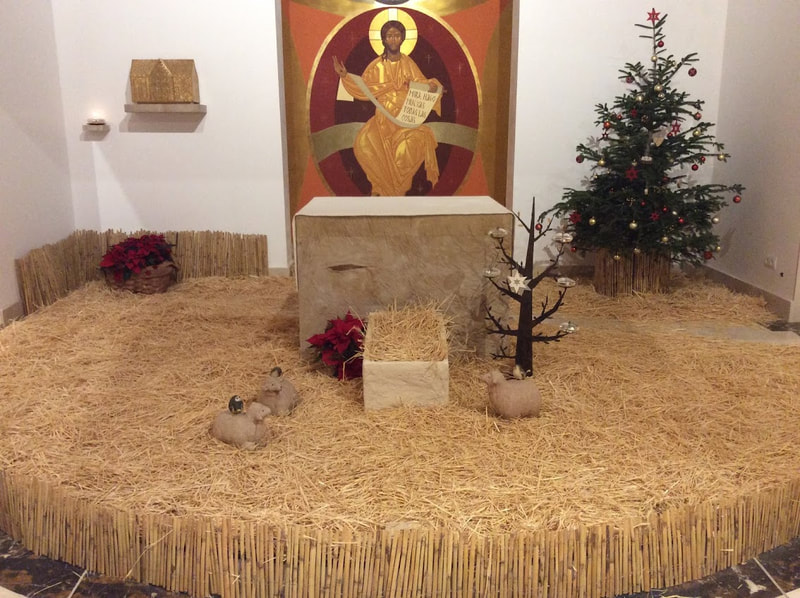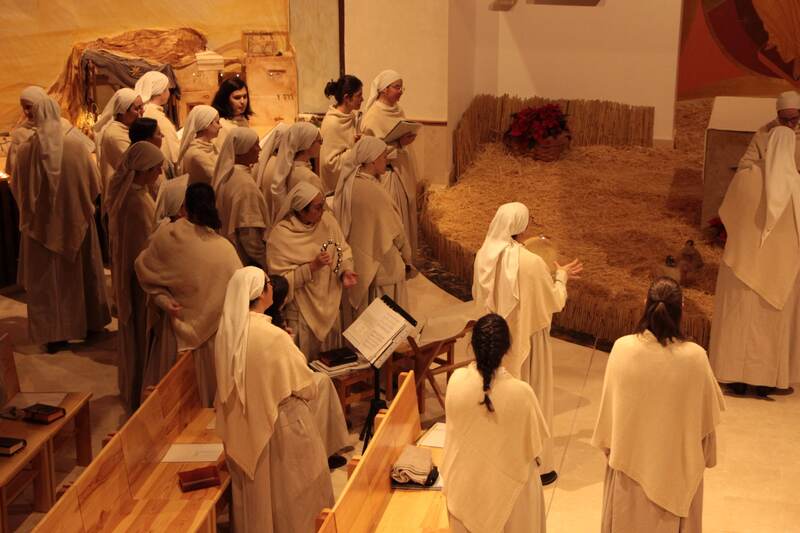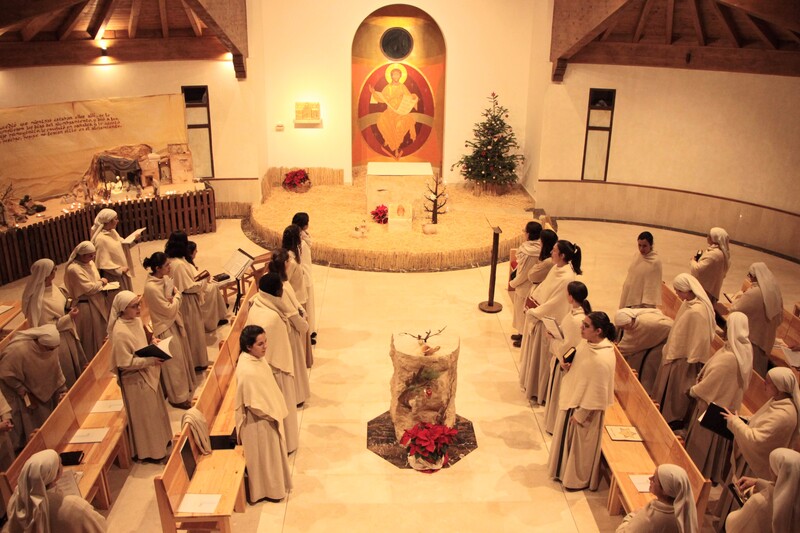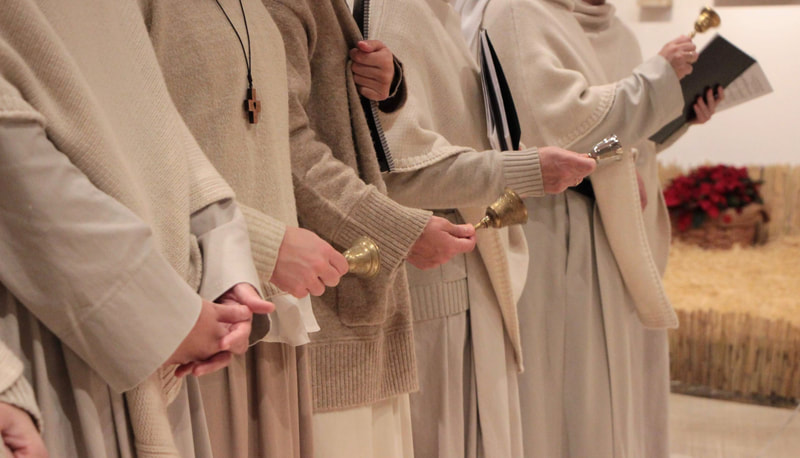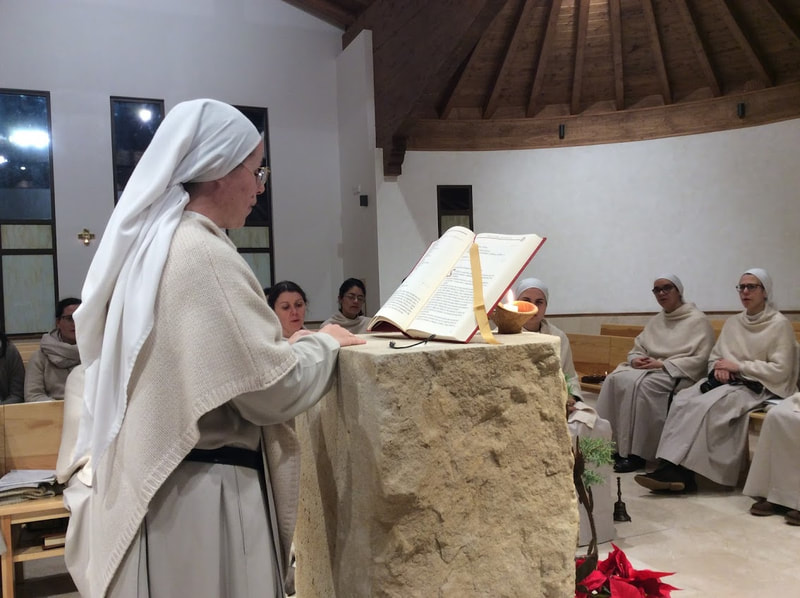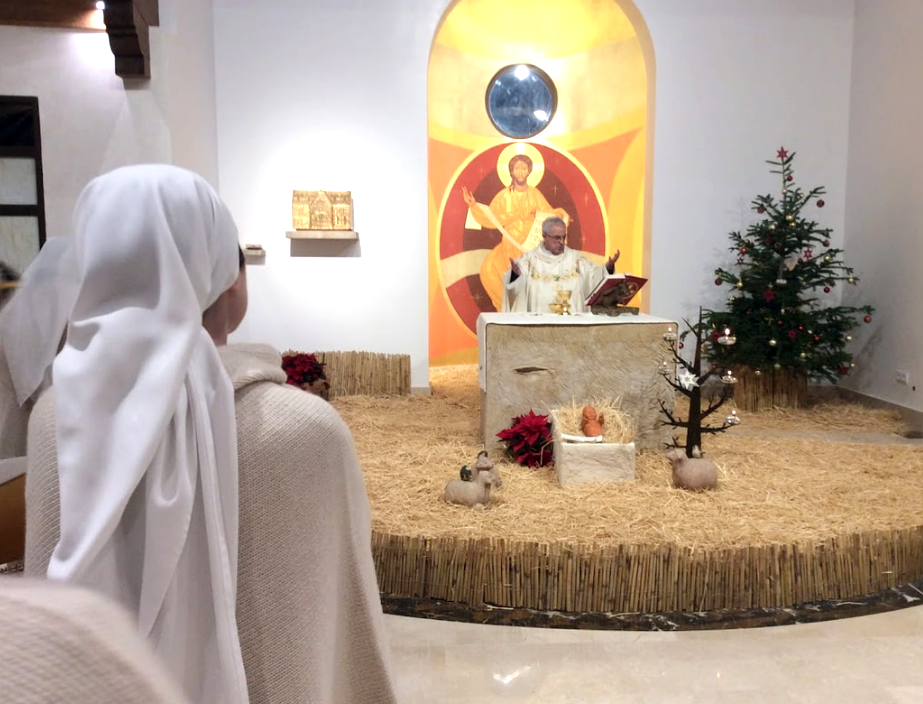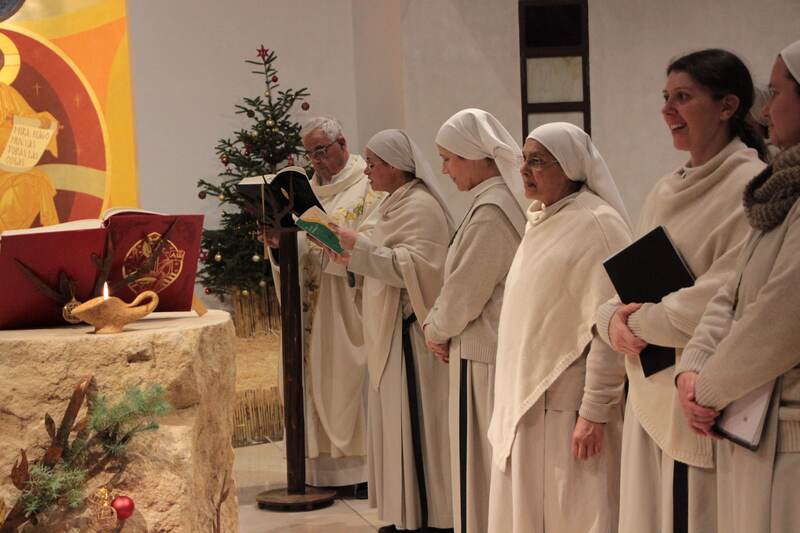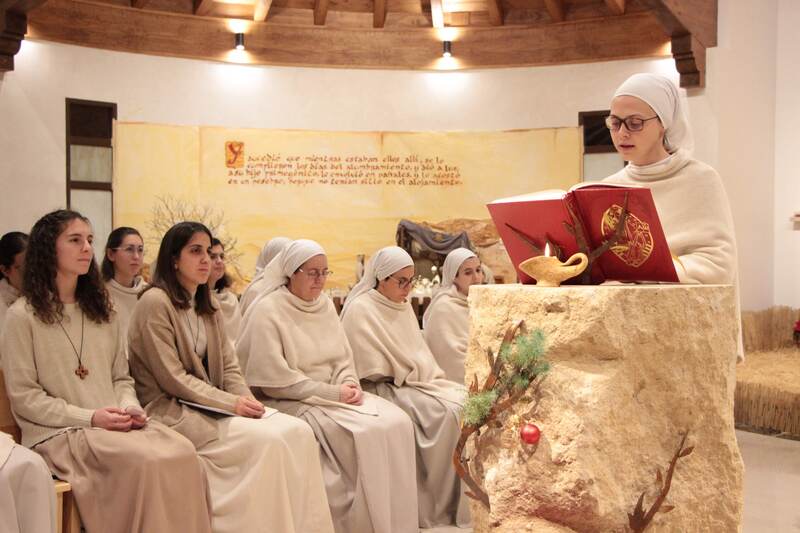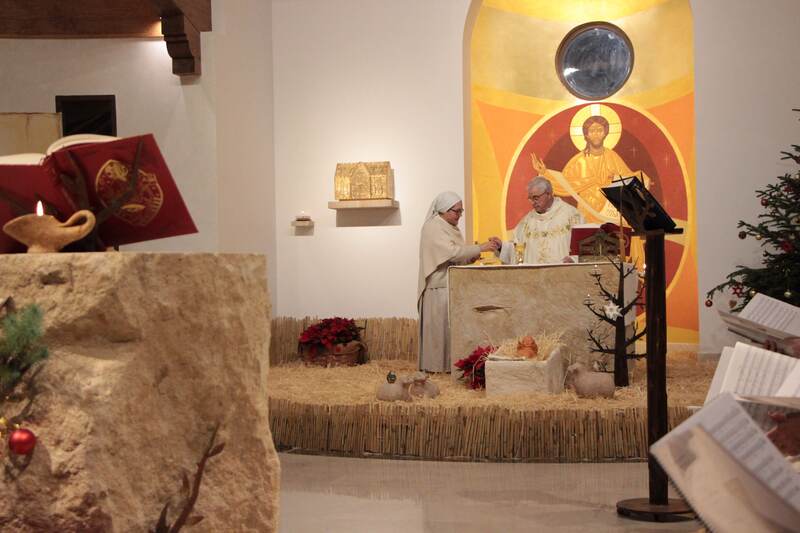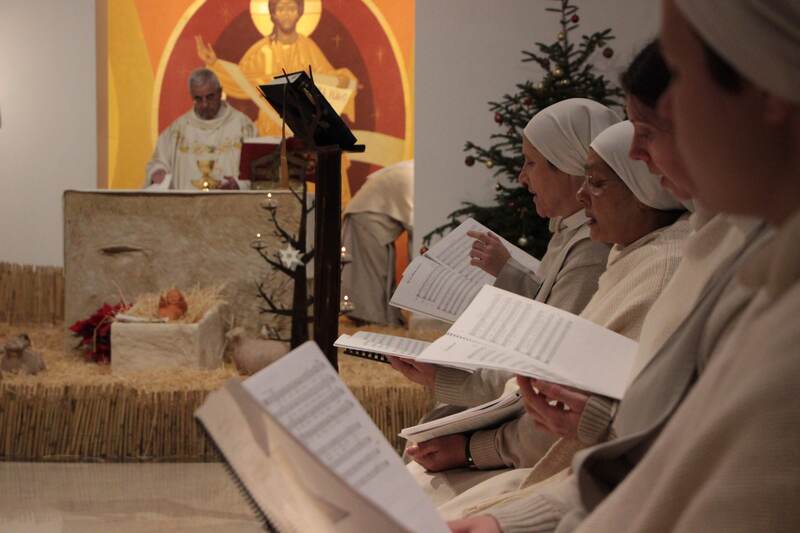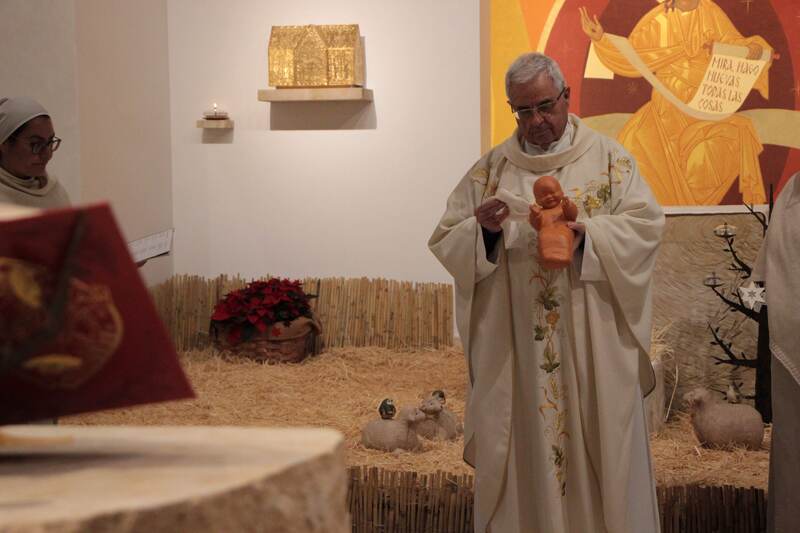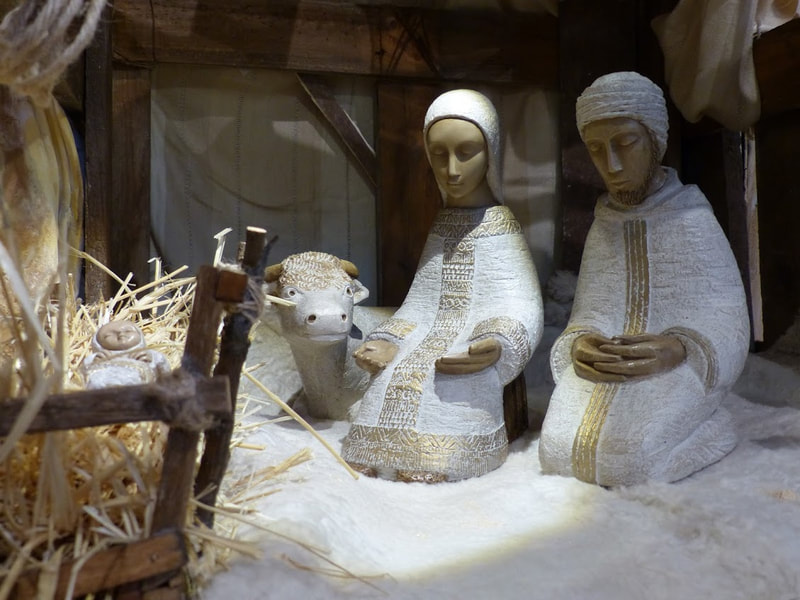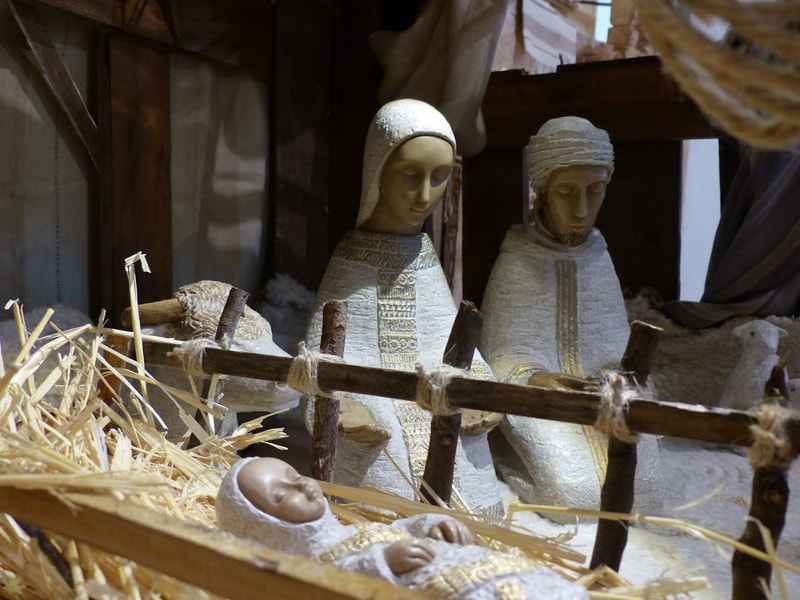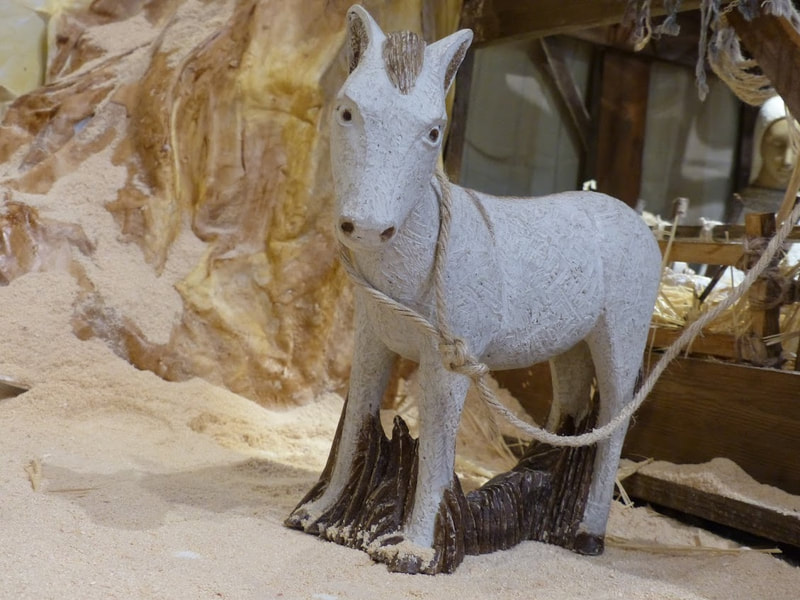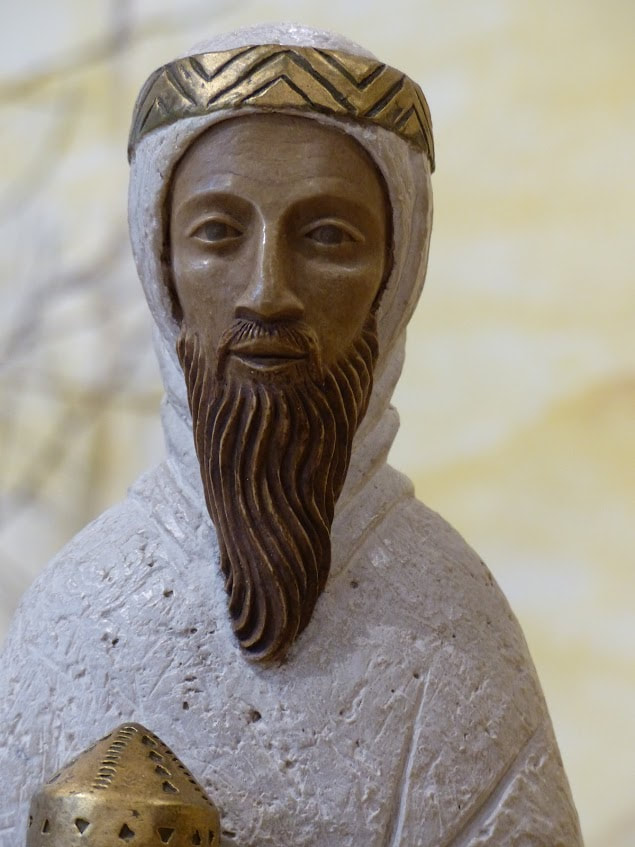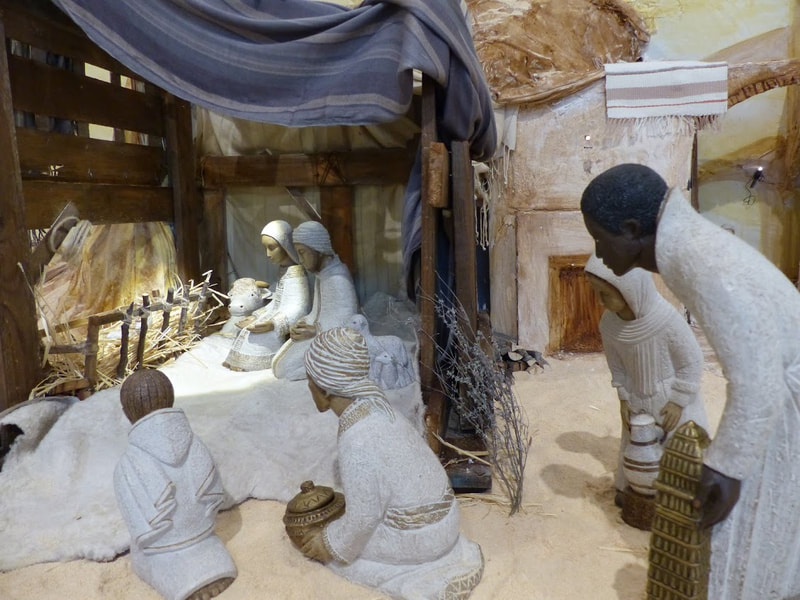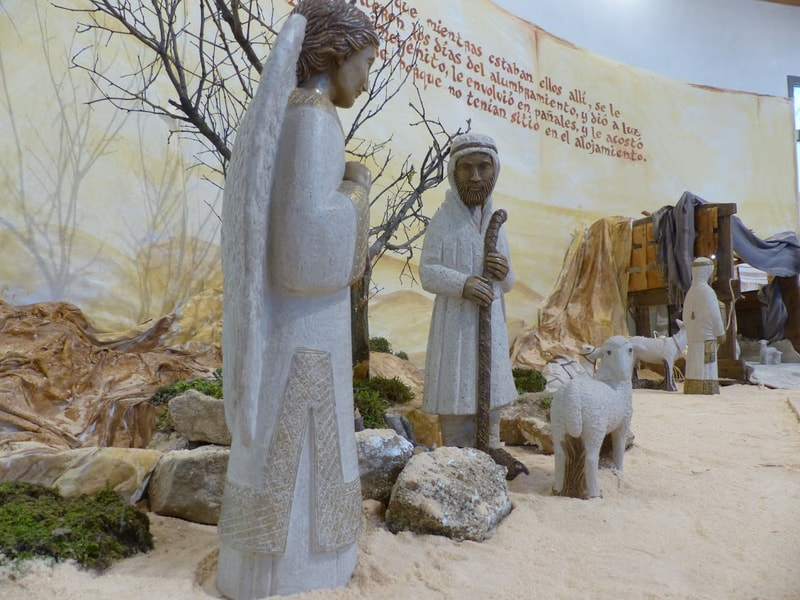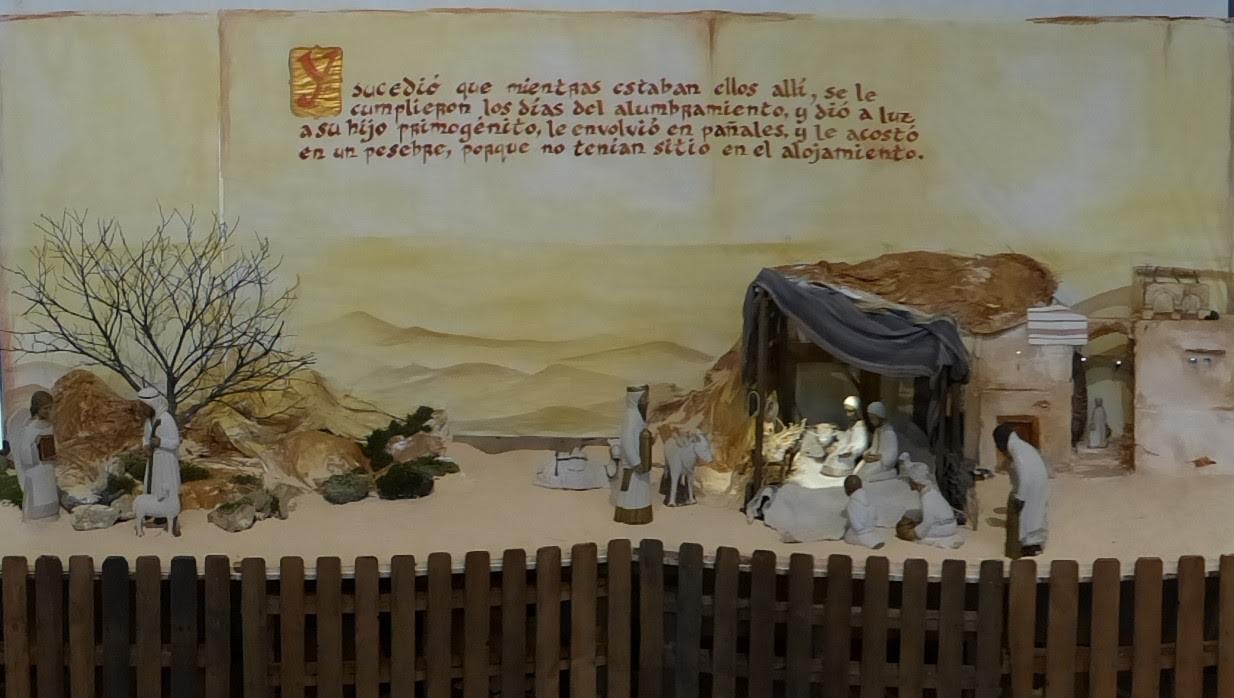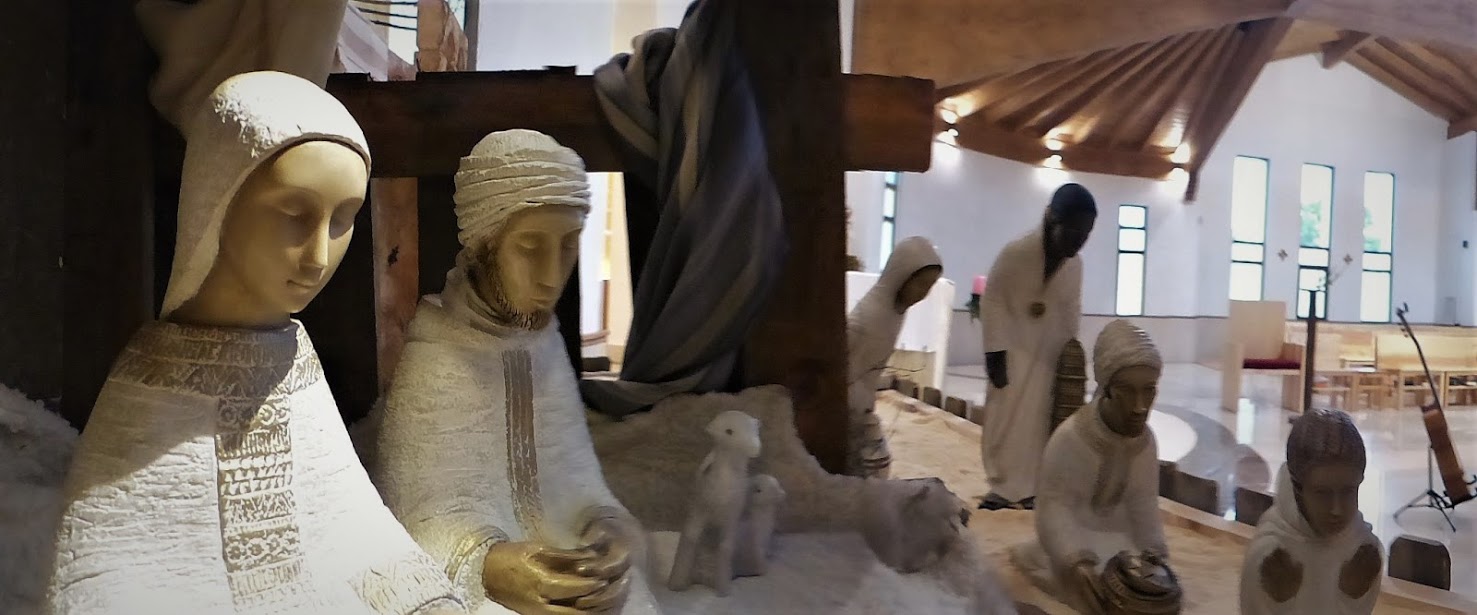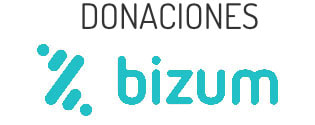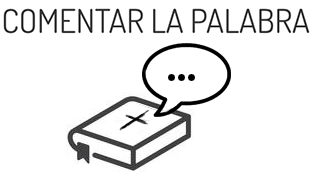Carta de Comunión. navidad 2019
UN MUNDO ANCHO Y AJENO. La “extrañeidad” Pongamos los ojos en el extraño, ese hombre que no casa bien en alguna sociedad y que provoca un encarnizamiento violento contra él. Suele ser invisible y molesto, al que no se le quiere mirar, o el que desagrada tanto que no queremos verlo. Se sale del marco de nuestras costumbres, de nuestros relatos, de nuestros pensamientos, de nuestros tranquilizadores pactos, y trae novedades que nos rompen las seguridades, las certezas antiguas, las comodidades más asumidas. Pero, al extraño se le impone la ausencia, no se le hace sitio, se le echa fuera. Es, sin embargo, aquél con el cual entablo la batalla de la alteridad, que me bendice y me quiebra a la vez, me hiere pero me hace ser. Es el extraño que mi existencia reclama, porque, si no fuera así, la vida se cerraría en los iguales, los similares, en los idénticos, espejos de mi propio yo. Sin sangre, sin lucha. Nuestro mundo es “ancho y ajeno”, hay en él muchas distancias, hostiles y lacerantes y es, tantas veces, un mundo ajeno, extraño, amenazador. ¡Cuánta violencia y agresividad hay detrás de toda distancia! ¡Cuánta distancia, amurallada, defendida, armada, hay en toda enemistad! ¡Qué extraños nos hacemos los unos a los otros! Esa extrañeidad nos ha adiestrado para la guerra (Is 2, 4) y nos ha distanciado dolorosamente. LA “EXTRAÑEIDAD” Y “EXTRANJEREIDAD” DEL HIJO DE DIOS Esta “extrañeidad” ha sido asumida por Jesús el Señor, el que se inclinó hacia nosotros, aunque nunca llegamos a comprender de dónde venía y adónde se dirigía, el que nos arrastraba y provocaba con sus Palabras y sus gestos, el que se acercó al pobre, al huérfano, a la viuda, al pecador, al enemigo, a los que todos dejaban fuera, a los extraños; el que nos reveló cómo era el Padre: un Dios siempre sorprendente, queprefirió al más extraño a Sí mismo: ¡el hombre!, ¡que eligió a un Pueblo extranjero siempre, peregrino, en busca de tierra!, ¡que se apostó a lapuerta del hombre para ser acogido como un extranjero en tierra extranjera!… Como lo fue siempre Jesús, el judío errante, marginal, que no fue entendido ni recibido por los suyos, hasta morir fuera de los muros de la ciudad. Como un criminal, como un EXTRANJERO, como un EXTRAÑO a todos. ICONO DE LA ACOGIDA: LA MATERNIDAD MARIAL Porque eligió la suerte del extraño y del extranjero, del que no tiene Patria, por eso fue Huésped en esta tierra inhóspita. “He aquí que estoy a la puerta llamando” (Ap 3, 20). Necesitó ser hospedado, acogido, como uno de nosotros porque todos somos seres hospedados, siempre huéspedes, acogidos en el seno de una madre, anidados, porque ésa era la posibilidad de ser y de vivir, y sin ese nido, seno, útero, matriz,hubiéramos muerto en el desierto arenoso de la existencia; y, sin el sí de una madre con voluntad de serlo, de acoger una vida dentro, de hospedar a una criatura humana, a su cachorro débil y siempre necesitado, hubiera fracasado rotundamente la pequeña célula en ellafecundada. Si realmente la muerte no tiene la última palabra (tampoco la penúltima) es porque la primera y la última palabra es la vida, el NACIMIENTO. Dios ha asumido la existencia humana hospedándose en ella, ¡NACIENDO! dejándose acoger, recibiendo todo de una Mujer. María es la Casa primera del Dios Huésped. Y, naciendo de Ella, ha querido hablarnos de qué es el hombre: el ser viviente, nacido de mujer, la madre inclinada hacia nosotros que se hizo cuenco de acogida para que la vida, la nuestra, fuera posible, que abrazó y acogiónuestra extrema vulnerabilidad, la absoluta debilidad que nos marca. Lo humano fue posible porque hubo una madre, una matriz, un albergue de carne y sangre, un cuerpo femenino, un pesebre de cálida textura. Y, porque lo humano se inicia con un hospedaje en el seno de una madre, el Hijo de Dios fue Hijo de una Madre que le concibió, le portó grávida en el seno, le dio a luz, le amamantó, le abrazó, le cuidó… le hospedó. El que vino de un país lejano para visitar a los que habitábamos en un país lejano y extraño, o lo éramos allí donde estuviésemos, trazó la rutade la hospitalidad humana que podía transformar toda hostilidad en acogida (Is 41, 12). Bastaba volver la mirada al Nacimiento, al comienzo de la vida. El icono de la Madre con el Hijo, la señal prometida por Dios (Is 7, 14) yrecibida por los que la buscaban (Mt 2, 9-11), será el aviso de cómo vivir en este mundo los unos con los otros, de cómo transformar estemundo violento y hostil… Mirando a la Madre y al Hijo comprendemos que el más grande ha de acoger al más pequeño, el fuerte al más débil,el que se vale por sí mismo al que no se vale, el que tiene al que no tiene, el que está arriba se incline sobre el que está más abajo. El que tiene casa que la abra y acoja al que no la tiene (Mt 25, 31-46). Madre e Hijo serán así el lugar teológico en el que poder comprender el amor de Dios sobre el hombre, un amor que se da, se ofrece, sepresenta como acogida, para bien del otro, fuera de todo interés propio, en el que el mayor se vierte hacia el menor, que se inclina y asíflorece. Contemplemos el Nacimiento, a Jesús en brazos de María. Tengamos, como María, la Madre, la Casa Encendida, la Puerta Abierta, la Mesa Puesta, para acoger a Aquel Dios extraño y extranjero que está fuera llamando. “He aquí que estoy fuera llamando” (Ap 3, 20). Su SÍ hospedó a Dios, el Huésped en su propia casa. Hoy, más que nunca, en nuestro mundo, es preciso encender la luz de nuestras casas, abrir las puertas, encender un fuego, poner una mesa y esperar a que Él venga, o venga otro en su nombre. Hoy hay que hacer de la acogida del otro, del extranjero, el pobre, la viuda, el pecador, el enemigo… el camino para transformar toda hostilidad en hospitalidad, toda enemistad en fraternidad, toda distancia en “projimidad”. No podemos dejar que el extraño no tenga sitio ni en nuestro corazón, ni en nuestra sociedad ni en nuestras comunidades o familias, parroquias o pueblos, o no encuentre una tierra para su escasez que mane leche y miel y muera en un mar sin tocar la orilla, o encuentre todas las puertas cerradas, o se le eche de nuestros recintos de seguridad… Podríamos comenzar por lo más cercano, porque, más allá, nos espera un mundo para que le abramos la puerta. Porque si no comenzamos por acoger y acogernos en nuestra extrañeza y “extranjereidad”, ¿cómo podremos un día vivir en Comunión? Y este es el destino: HACIA LA COMUNIÓN CON EL OTRO. Un día, Él, Jesús el Señor, el que ahora está llamando para que le abramos, a punto de nacer de María la Madre, un día nos sentará a su derecha, en una Mesa en la que habrá un Pan partido, inmenso, para todos, y en la que tendremos enfrente a nuestros enemigos, a los extraños amados por él, a los que no nos hemos acercado jamás ni hemos abierto las puertas, a los que servimos de mala gana, y se inclinará sobre nosotros, nos lavará los pies y entonces se nos abrirán los ojos y comprenderemos por donde hay que empezar para llegar a ser uno en Él y con Él, y Él uno con nosotros. Él está fuera, llamando a la puerta. Abriremos y ¡nacerá! Feliz Navidad de la Acogida. M. Prado Federación de la Conversión de san Agustín, OSA. Communion Letter. Christmas 2019
A WIDE AND ALIEN WORLD. “Strangeness” Let us set our eyes upon the stranger, that person who doesn’t seem to fit in in some society or other, and who triggers a violent fierceness against him. He tends to be invisible and troublesome, nobody wants to look at him, or he displeases us so that we don’t want to even see him. He goes beyond our customs, our stories, our thoughts, our soothing agreements, and he brings along with him the novelty that breaks down our securities, our reassurances from of old, our greatly assumed comfort. But there’s an absence imposed upon the stranger, there is no room left for him, he is thrown out. Yet he is the one with whom I engage in the battle of otherness, the one who both blesses and breaks me, he hurts me but he makes me be. He is the stranger my existence claims for, because if it weren’t for him, life would be reduced to those who are equals, similar, identical, to a mirror of my own self. With no blood, with no struggle. Our world is wide and alien, full of hostile and lacerating distances, an alien, strange, threatening world. There is such violence and aggression behind every distance! And in every enmity, so many defended and armed distances. We become such strangers to one another! That strangeness has prepared us for war (Is 2,4) and has hurtfully brought us apart. THE ‘STRANGENESS’ AND ‘FOREIGNNESS’ OF GOD’S SON Jesus, the Lord, has assumed this “strangeness”, he who bent down towards us, although we never managed to understand where he came from or where he was headed for, he who attracted us and provoked us with his words and gestures, he who reached out to the poor, the orphan, the widow, the sinner, the enemy, the outsiders, the strangers; he who revealed to us what the Father was like: an always surprising God, who preferred the strangest to himself: mankind! The People he chose were always foreigners, pilgrims, searching for land! He came to our door to be welcomed in as a stranger in a strange land. Just like Jesus always was, the errant and marginal jew, who wasn’t understood or received by his own people and died outside the walls of the city. As if he were a criminal, a FOREIGNER, a STRANGER to everyone. ICON OF “WELCOMENESS”. MARY’S MATERNITY He chose for himself the same fate strangers and foreigners share, and therefore became a Guest in this inhospitable land. “Here I am! I stand at the door and knock” (Rev 3, 20). He also had the need to be welcomed, received, just like one of us, because we have all been welcomed, guests, received in a mother’s womb, nested, because that’s the possibility to be and to live, and if without that nest, womb, matrix, we would’ve died in the sandy desert of existence. And the tiny fecundated cell would have failed completely if not for the Yes of a mother willing to be so, willing to receive life within her, to welcome a human creature, frail and in need. If death really doesn’t have the last word (nor the last but one) it is because life, BIRTH, is the first and last word. God has assumed the human existence by taking refuge in it, by being born! By receiving everything from a Woman. Mary is God’s first House, a God who is also a Guest. And by being born from her, he has wanted to tell us what is a man: the living being, born from a woman, the mother bent down towards us, who receives us in her so that life, our own life, can be made possible. The mother who has embraced and received our extreme vulnerability, the absolute weakness. Human life is only possible because there is a mother, a womb, a refuge made out of flesh and blood, a feminine body, a cozy manger. And because human life starts with a hostage in a mother’s womb, God’s Son was Son to a Mother who conceived him, gave birth to him, embraced him, took care of him... she hosted him. He who came from a far away country to visit those of us who lived in a far away and strange country, showed us the way of human hospitality, which could transform hostility into “welcomeness” (Is 41, 12). We need only to set our eyes on the moment of Birth, the beginning of life. The icon of the Mother with the Son, the sign God promised (Is 7, 14) and those who were looking for it received (Mt 2, 9-11), will tell us how to live among us in this world, how to transform this violent and hostile world... by looking at the Mother and the Son we will understand that the eldest must receive the youngest, the strongest must receive the weakest, the one who fends for himself receive the one who doesn’t, the one who has, the one who doesn’t have, the one who is in a higher position, the one who is in the lower. He who has a house should open its doors and welcome the one who has no house (Mt 25, 31-46). Mother and Son become the theological place where we can understand God’s love for mankind, a love that gives itself, offers itself, welcomes others for their own good and lacks all self-interest. A love in which the elder one pours himself over the younger, bends down, and therefore bears fruit. Let’s contemplate the Nativity, Jesus in Mary’s arms. Let us have, like Mary, the Mother, the House Lit up, the Door Opened, the Table Laid, to welcome that strange and foreign God who is outside, knocking on the door. “Here I am! I am outside, knocking” (Rev 3, 20). Her YES welcomed God, the Guest in his own house. Today, more than ever, in our world, we have to turn on the light in our homes, open the doors, light up a fire, lay a table and wait for Him to arrive, or someone else in His name. We will be able to transform all hostility into hospitality, all enmity into fraternity, all distance into proximity, by welcoming others, the foreigner, the poor, the widow, the sinner, the enemy... We mustn’t prevent the stranger from having a place in our heart or in our society, communities or families, parishes or towns, or from finding a land for his shortage that will provide him with milk and honey. We mustn’t allow him to die at sea without even touching the shore, or to find all the doors locked, or to be kicked out of our security areas... we could start by those who are closer to us, because beyond that, a world is waiting for us to open the door. Because if we don’t start by receiving each other in our “strangeness” and “foreignness”, how will it be possible for us to one day live in Communion? And that is the destiny: TOWARDS COMMUNION WITH OTHERS. Jesus the Lord, who is now knocking on the door so that we may open, who is just about to be born from Mary the Mother, will one day sit us down at his right side at a table on which there will be a broken bread, a huge one, for everyone. At this table we will sit together with our enemies, the strangers He loves, those we have never dared to be with and even less open our door, those whom we serve unwillingly... He will bend down towards us and wash our feet, and then our eyes will be opened, and we will understand where to start from in order to be one in Him and with Him, and He one with us. He is just outside, knocking on our door. Let’s open the door and he will be born! Happy Christmas of “welcomeness” M. Prado Federation of the Conversion of saint Augustine, OSA Pascha Narodzenia Pańskiego 2019
ŚWIAT SZEROKI I OBCY. „Inność”. Przyjrzyjmy się obcemu, człowiekowi, który nie pasuje do żadnej społeczności i jest obiektem agresywnej bezduszności. Zwykle jest niewidoczny i lub tak denerwujący, że nie chce się na niego patrzeć, albo tak odpychający, że odwraca się wzrok, żeby go nie widzieć. Wymyka się poza ramy naszych przyzwyczajeń, naszych historii, naszych myśli, naszych uspokajających układów i wnosi novum, które zaburza nasze poczucie bezpieczeństwa, odwieczne prawdy, strefę komfortu. Dlatego obcemu narzuca się nieobecność, nie robi mu się miejsca, wyrzuca się go na zewnątrz. Jednak to ten, z którym toczę bitwę odmienności, to ten, który jednocześnie mnie błogosławi i łamie, rani mnie i przez to sprawia, że jestem. To jest ten inny, którego moje istnienie się domaga, ponieważ inaczej życie zamknęłoby się wśród jednakowych, podobnych, identycznych, zwierciadłach mojego ja. Bez krwi, bez walki. Nasz świat jest „szeroki i obcy”, jest w nim dużo rezerwy, wrogiej i raniącej, i tak często ten świat jest obcy, dziwny, zagrażający. Ile przemocy i agresji kryje się za każdym dystansem! Ile jest w każdej wrogości dystansu obwarowanego, obronnego, uzbrojonego! Jak obcy stajemy się jedni dla drugich! Ta obcość zaprawiła nas do wojny (Is 2,4) i boleśnie nas rozdzieliła. INNOŚĆ I NIETUTEJSZOŚĆ SYNA BOŻEGO. Odmienność została przyjęta przez Jezusa Pana, który się nachylił ku nam, chociaż nigdy nie zdołamy zrozumieć, skąd przychodził i dokąd zmierzał ten, który nas prowokował i pociągał swoimi słowami i czynami, ten, który się zbliżał do ubogiego, do sieroty, wdowy, grzesznika, wroga, do pomijanych, obcych; ten, który objawił nam, kim jest Ojciec: Bogiem nieustannie zaskakującym, który upodobał sobie to, co najbardziej odmienne od Niego samego – człowieka!, który wybrał sobie Lud cudzoziemców, pielgrzymów, poszukujących ziemi, który stanął przed drzwiami człowieka, aby zostać przyjęty jako obcy w obcej ziemi. Jezus zawsze taki był: marginalizowany, Żyd tułacz, który nie został zrozumiany ani przyjęty przez swoich, któremu swoi zgotowali śmierć poza murami miasta. Jak kryminalista, jak NIEZNAJOMY, OBCY wszystkim. IKONA GOŚCINNOŚCI. MACIERZYŃSTWO MARYI. Dlatego że wybrał los obcego i cudzoziemca, tego, który nie ma Ojczyzny, został Gościem na tej niegościnnej ziemi. „ Oto stoję u drzwi i kołaczę” (Ap 3,20). Potrzebował być ugoszczony, przyjęty jak jeden z nas, bo wszyscy jesteśmy gośćmi, zawsze gośćmi, przyjętymi w łonie matki, zagnieżdżonymi, taki jest warunek naszego bycia i życia, bez tego gniazda, łona, macicy, matecznika, umarlibyśmy na piaszczystej pustyni istnienia. Bez zgody matki, tej, która zechciała nią być, przyjąć życie w siebie, ugościć ludzkie stworzenie, swojego słabego i zawsze potrzebującego pisklaka. Bez niej zapłodniona, mikroskopijna komórka poniosłaby kompletną porażkę. Jeśli rzeczywiście śmierć nie ma ostatniego słowa (ani przedostatniego), to dlatego, że pierwsze i ostatnie słowo to życie, to NARODZENIE. Bóg przyjął ludzkie istnienia, zamieszkując, RODZĄC SIĘ, pozwalając się przyjąć Kobiecie, aby wszystko od niej otrzymać. Maryja jest pierwszym Domem Boga-Gościa. Rodząc się z niej, zechciał powiedzieć nam o tym, kim jest człowiek: jest istotą żyjącą, narodzoną z kobiety, z matki pochylonej nad nami, która siebie samą uczyniła naczyniem gościnności, aby nasze życie stało się możliwe; z tej, która objęła i przyjęła naszą słabość, tę naszą całkowitą bezbronność. To, co ludzkie, stało się możliwe, ponieważ była matka, łono, schronienie z ciała i krwi, kobiece ciało, żłóbek o ciepłej wyściółce. A ponieważ to, co ludzkie, rozpoczyna się od ugoszczenia w łonie matki, Syn Boży został Synem pewnej Matki, która go poczęła, nosiła go brzemienna w swoim łonie, urodziła, karmiła piersią, przytulała, troszczyła się o niego… Przyjęła go. Ten, który przybył z dalekiego kraju, aby nawiedzić nas, którzy zamieszkiwaliśmy kraj daleki i obcy, którzy byliśmy cudzoziemcami, wyznaczył drogę ludzkiej gościnności, która zamieniła wszelką wrogość w gościnne przyjęcie (Iz 41, 12). Wystarczyło spojrzeć na Narodzenie, na początek życia. Ikona Matki z Synem, znak obiecany przez Boga (Iz 7, 14) i przyjęty przez tych, którzy go szukali (Mt 2, 9-11), uczy, w jaki sposób na tym świecie możemy żyć jedni z drugimi, jak przemieniać ten wrogi i brutalny świat… Przyglądając się Matce i Synowi, rozumiemy, że większy powinien przyjąć mniejszego, silniejszy słabszego, ten, który zna swoją wartość tego, który nie czuje się godny, ten, który ma, tego, który nie ma, ten, który jest u góry, ma pochylić się nad tym, który jest niżej. Ten, który ma dom, niech go otworzy i przyjmie tego, który domu nie ma (Mt 25, 31- 46). Matka i Syn staną się w ten sposób miejscem teologicznym, w którym można pojąć miłość Boga do człowieka, miłość, która się daje, która się oddaje, która się objawia jako gościnne przyjęcie, dla dobra drugiego, bez szukania własnej korzyści, gdzie większy przelewa się na mniejszego, pochyla się ku niemu i tym samym rozkwita. Kontemplujemy Narodzenie, Jezusa w ramionach Maryi. Tak jak Maryja, Matka, mamy Nasz Dom rozświetlony, Drzwi Otwarte, Stół zastawiony na przyjęcie tego nieznajomego i nietutejszego Boga, który stoi na zewnątrz i kołacze. „Oto stoję u drzwi i kołaczę” (Ap 3, 20). Jej „tak” ugościło Boga, Gościa w Jego własnym domu. Dzisiaj bardziej niż kiedykolwiek odczuwamy w naszym świecie potrzebę zapalenia światła w naszych domach, otwarcia drzwi, rozpalenia ognia, przygotowania stołu i oczekiwania, że przyjdzie albo On, albo ten, który idzie w Jego imię. Dzisiaj trzeba ugościć innego, przybysza, ubogiego, wdowę, grzesznika, wroga… wybrać drogę przemiany wrogości w gościnność, niechęci w braterstwo, wszelkiego dystansu w bliskość. Nie możemy pozwolić, żeby obcy nie miał miejsca w naszym sercu, w naszym społeczeństwie, w naszych wspólnotach i rodzinach, parafiach i miastach, żeby nie mógł znaleźć ziemi mlekiem i miodem płynącej dla zaspokojenia swoich niedostatków i żeby umierał w morzu, zanim dobije do brzegu, albo napotkał wszystkie drzwi zamknięte, albo żeby go wykluczano z naszych bezpiecznych stref… Moglibyśmy zacząć od tych, co najbliżej nas, ponieważ, tam, dalej świat czeka, żebyśmy mu otworzyli drzwi. Bo jeśli nie zaczniemy od przyjmowania siebie nawzajem w naszej dziwności i nietutejszości, jak możemy któregoś dnia osiągnąć Komunię? To jest nasz cel: W KIERUNKU KOMUNII Z DRUGIM. Pewnego dnia, On, Jezus Pan, ten, który teraz stoi u drzwi i kołacze, żebyśmy mu otworzyli, który zaraz ma się narodzić z Maryi Matki, pewnego dnia posadzi nas po swojej prawicy, przy Stole, na którym będzie łamany chleb, ogromny, dla wszystkich. Posadzi nas naprzeciwko naszych wrogów, umiłowanych przez Niego obcych, tych, do których się nie zbliżyliśmy, którym nigdy nie otworzyliśmy drzwi, tych, którym służymy od niechcenia. On się nad nami pochyli, umyje nam stopy, a wtedy otworzą się nam oczy i zrozumiemy, od czego trzeba zacząć, żeby móc być Jedno w Nim i z Nim i żeby On był jedno w nas. On jest na zewnątrz, kołacze do naszych drzwi. Otwórzmy, a wtedy się narodzi! Błogosławionych Świąt Bożego Narodzenia w duchu gościnności! M. Prado Federacja Nawrócenia świętego Augustyna, OSA Weihnachtsbrief 2019
EINE WEITE UND FREMDE WELT. Die “Fremdartigkeit”. Richten wir unseren Blick auf den Fremden, diesen Menschen, der nicht gut in eine Gesellschaft passt und eine erbitterte Gewalt gegen sich provoziert. Normalerweise ist er unsichtbar und unangenehm, einer, den man nicht anschauen möchte, oder der so unangenehm ist, dass wir ihn nicht einmal sehen möchten. Er sprengt den Rahmen unserer Gewohnheiten, unserer Kontexte, unserer Gedanken, unserer organisierten Existenz und bringt Neuheiten, die unsere Sicherheiten zunichtemachen, althergebrachte Gewissheiten, längst eingesessene Bequemlichkeiten. Den Fremden weist man also ab, man macht ihm keinen Platz, man wirft ihn hinaus. Er ist es jedoch, mit dem ich in den Kampf der Andersartigkeit trete, der mich segnet und mich gleichzeitig bricht, mich verletzt, aber mich auch zum Sein bringt. Der Fremde ist es, den meine Existenz braucht, denn, wenn dem nicht so wäre, würde sich das Leben auf Gleichartige, Ähnliche, Identische beschränken, Spiegel meiner selbst. Blutlos, kampflos. Unsere Welt ist “weit und fremd”, in ihr existieren viele feindliche und verheerende Distanzen, und oft ist sie eine fremde, befremdliche und bedrohende Welt. Wieviel Gewalt und Aggressivität gibt es in jeder Distanz! Wieviel ummauerte, verteidigte, bewaffnete Distanz gibt es in jeder Feindschaft! Wie fremd werden wir einander! Diese Fremdheit hat uns die Kriegsführung gelehrt (Jes 2, 4) und uns schmerzlich immer mehr voneinander entfernt. DIE “FREMDHEIT” UND “FREMDARTIGKEIT” DES GOTTESSOHNES. Diese Fremdheit hat Jesus, der Herr, auf sich genommen, er, der sich zu uns herabgeneigt hat, auch wenn wir nie verstehen werden, woher er kam und wohin er ging, er, der uns mit seinen Worten und Gesten mitriss und provozierte, der sich dem Armen, dem Waisen und der Witwe näherte, dem Sünder, dem Feind, denen, die alle anderen abwiesen, den Fremden; der uns das Wesen des Vaters offenbarte: ein immer überraschender Gott, der den bevorzugte, der ihm am Fremdesten war: den Menschen! Der ein Volk erwählte, das immer in der Fremde lebte, pilgernd, auf der Suche nach Heimatland! Der sich vor die Tür des Menschen stellt, um von ihm als Fremder in einem fremden Land aufgenommen zu werden! ... Wie Jesus es immer war, der umherziehende Jude, am Rande stehend, der von den Seinen weder verstanden noch aufgenommen wurde, bis hin zu seinem Tod außerhalb der Stadtmauern. DAS SYMBOL DER AUFNAHME: DIE MARIANISCHE MUTTERSCHAFT. Weil er das Schicksal des Fremden und des heimatlosen Ausländers wählte, wurde er Gast in dieser ungastlichen Welt. “Ich stehe vor der Tür und klopfe an” (Offb 3, 20). Er musste beherbergt, aufgenommen werden wie einer von uns, denn wir alle sind beherbergte Wesen, immer Gäste, aufgenommen im Mutterschoß, eingenistet, denn dieser Weg hat es möglich gemacht zu sein und zu leben, und ohne dieses Nest, diesen Schoß, diese Gebärmutter wären wir in der sandigen Existenzwüste gestorben; und ohne das Ja einer Mutter, die einwilligt, eine solche zu sein, ein Leben in sich aufzunehmen, ein menschliches Geschöpf zu beherbergen, ein schwaches und bedürftiges Baby, wäre die kleine befruchtete Zelle in ihr gänzlich gescheitert. Dass der Tod wirklich nicht das letzte Wort hat (und auch nicht das vorletzte), liegt daran, dass das erste und das letzte Wort das Leben ist, die GEBURT. Gott hat die menschliche Existenz angenommen, indem er sich in ihr beherbergte, ER WURDE GEBOREN! Er ließ sich aufnehmen, hat alles von einer Frau empfangen. Maria ist das erste Haus, das Gott als Gast empfing. Und, aus ihr geboren, wollte er uns darlegen, was der Mensch ist: das lebendige Wesen, von einer Frau geboren, die uns zugeneigte Mutter, die zum Empfangsgefäβ wurde, um das Leben, unser Leben zu ermöglichen, die unsere extreme Verletzlichkeit umarmte und aufnahm, die uns kennzeichnende absolute Schwachheit. Das Menschliche wurde möglich, weil es eine Mutter gab, eine Gebärmutter, eine Herberge aus Fleisch und Blut, ein weiblicher Körper, eine Krippe aus warmer Beschaffenheit. Und weil das Menschliche in der Beherbergung in einem Mutterschoß seinen Anfang nimmt, wurde der Gottessohn der Sohn einer Mutter, die ihn empfing, die ihn schwanger in ihrem Schoß trug, ihn gebar, ihn stillte, ihn umarmte, ihn umsorgte ... ihn aufnahm. Er kam aus einem fernen Land, um uns zu besuchen, die wir in einem fernen und fremden Land wohnen, und die wir Fremde sein werden, wo auch immer wir uns befinden; er zeigte den Weg der menschlichen Gastfreundschaft auf, die jede Feindschaft in Aufnahme wandeln konnte (Jes 41, 12). Es genügte, den Blick auf die Geburt zu lenken, auf den Lebensbeginn. Das Symbol der Mutter mit dem Kind, das von Gott verheißene Zeichen (Jes 7, 14), und empfangen von denen, die es suchten (Mt 2, 9 - 11), wird es Weisung sein, wie wir miteinander in dieser Welt leben sollen, wie diese gewaltsame und feindliche Welt verwandeln... Wenn wir auf die Mutter mit dem Kind schauen, verstehen wir, dass der Größere den Kleineren aufnehmen muss, der Starke den Schwachen, der, der alleine zurechtkommt, den, der nicht alleine zurechtkommt, der, der hat, den, der nicht hat, derjenige,der weiter oben ist, sich zu dem herabneigen, der weiter unten ist. Der ein Haus hat, öffne es und nehme den auf, der keines hat (Mt 25, 31-46). Mutter und Sohn werden somit der Ort der theologischen Erkenntnis, an dem wir die Liebe Gottes zu den Menschen kennen lernen können, eine Liebe, die sich gibt, sich schenkt, sich als Aufnahme darstellt, zum Wohle des anderen, ohne irgendein Eigeninteresse, wo der Ältere sich des Jüngeren annimmt, der sich ihm zuwendet und so wachsen kann. Betrachten wir die Geburt, Jesus in den Armen Marias. Lasst uns wie Maria, die Mutter, das Haus aufgewärmt haben, die Tür offen, den Tisch gedeckt, um jenen Fremden und fremdländischen Gott aufzunehmen, der draußen ist und anklopft. “Ich stehe vor der Tür und klopfe an” (Offb 3, 20). Ihr Ja beherbergte Gott, den Gast, in seinem eigenen Haus. In unserer heutigen Welt ist es notwendiger denn je, das Licht unseres Hauses anzumachen, die Türen zu öffnen, das Feuer anzuzünden, den Tisch zu decken und zu warten, bis Er kommt, oder ein anderer in seinem Namen. Heute müssen wir die Aufnahme des Anderen, des Fremden, des Armen, der Witwe, des Sünders, des Feindes... zum Weg machen, um jegliche Feindseligkeit in Gastfreundschaft zu wandeln, jegliche Feindschaft in Brüderlichkeit, jegliche Distanz in Nähe. Wir können nicht zulassen, dass der Fremde keinen Platz findet, weder in unserem Herzen, noch in unserer Gesellschaft, noch in unseren Gemeinschaften oder Familien, Pfarreien oder Dörfern, kein Land, in dem Milch und Honig flieβen, für seine Bedürftigkeit, und dass er in einem Meer sterben muss, ohne ein Ufer zu erreichen, oder alle Türen verschlossen vorfindet oder aus unseren Sicherheitszonen vertrieben wird... Wir könnten mit dem Nächststehenden beginnen, denn hinter ihm wartet eine Welt auf uns, die uns bittet, ihr die Tür zu öffnen. Wenn wir nicht beginnen, den anderen aufzunehmen, uns an- und aufzunehmen in unserer Fremdartigkeit und Eigenartigkeit, wie können wir dann eines Tages in Einheit leben? Und dies ist das Ziel: DER EINHEIT MIT DEM ANDEREN ENTGEGEN. Eines Tages wird Er, Jesus, der Herr, der heute anklopft, damit wir ihm öffnen, der im Begriff steht, von Maria geboren zu werden, uns zu seiner Rechten setzen, an einem Tisch mit einem gebrochenen Brot, riesengroß, für alle, und an dem wir unseren Feinden gegenübersitzen werden, den von ihm geliebten Fremden, die, denen wir uns nie genähert haben und denen wir nie die Türen öffneten, denen wir nur widerwillig geholfen haben, und er wird sich zu uns herabneigen, uns die Füβe waschen; und dann werden uns die Augen aufgehen und wir werden verstehen, womit wir beginnen müssen, um eins in Ihm und mit Ihm zu werden, und Er eins mit uns. Er steht draußen und klopft an die Tür. Öffnen wir und Er wird geboren! Frohe Weihnachten der Aufnahme. M. Prado Föderation der Bekehrung des Hl. Augustinus, OSA közösség levél. 2019 karácsony
SZÉLES, IDEGEN VILÁG. AZ IDEGENSÉG Vessünk egy pillantást az idegenre, aki nem illik bele a társadalomba és ellenséges indulatokat ébreszt önmagával szemben. Jelenléte zavaró, feltűnésmentes; nem akarjuk észrevenni. Annyira kellemetlen, hogy inkább rá se nézünk. Elüt a megszokottól, kimarad a beszédtémáinkból, gondolatainkból, egyezkedéseinkből. Újat hoz, kizökkent a biztonságból, régi bizonyosságainkból, a már megszokott kényelemből. De az idegen szükségszerűen kívül marad, nem kap helyet. Kitessékelik. Ugyanakkor akivel felveszem a másság harcát, éppen ő az, aki számomra egyszerre áldás és megtöretés; megbánt, de hozzá segít, hogy legyek. Az idegen után kiált a létem, mert ha nem így lenne, akkor a hozzám hasonlók közé zárna az élet, akik pont olyanok, mint én, egyenlőek velem, tükörképeim. Vér és harc nélkül. Világunk széles és idegen. Sok ellenséges és fájó távolság van benne, sokszor idegen, furcsa és fenyegető. Mennyi erőszak és agresszivitás van minden távolság mögött! Mennyi fal, védekezés, fegyverkezés van minden ellenségességben! Milyen idegenné válunk egymás számára! Ez az idegenség háborúra késztet (Iz 2,4) és fájdalmasan eltávolít egymástól bennünket. AZ ISTEN FIA IDEGEN, IDEGEN FÖLDRőL VALÓ Az Úr Jézus ezt az idegenséget vette magára. Lehajolt hozzánk, bár sosem érthetjük meg, honnan jött és hová ment. Szavai és tettei magával ragadtak és kérdőre vontak bennünket. Odament a szegényhez, az árvához, az özvegyhez, a bűnöshöz, az ellenséghez, akit mindenki kizárt, az idegenhez. Megmutatta nekünk, hogy milyen az Atya: a meglepetések Istene, aki a tőle legidegenebbet választotta magáénak: az embert! Idegen, folyton vándorló, helyet kereső Népet választott magának és megjelent az ember ajtaja előtt, hogy bebocsájtást kérjen; idegenként, idegen földön!… Jézus mindig is ilyen volt: vándor zsidó, kitaszított, meg nem értett, akit az övéi nem fogadtak be. Olyannyira nem, hogy a városfalon kívül kellett meghalnia, mint egy bűnözőnek; mint aki IDEGEN FÖLDRŐL VALÓ, mindenki számára IDEGEN. A BEFOGADÁS IKONJA: A MÁRIÁS ANYASÁG Mivel az idegen, az idegen földről való sorsát választotta, a hontalanét, Vendég volt ezen a barátságtalan földön. “Az ajtóban állok és kopogok” (Jel 3,20). Egy volt közülünk, neki is szüksége volt arra, hogy befogadják, megvendégeljék. Mindannyian vendégek vagyunk, szállást kaptunk a földön, az anyaméh fogadott be bennünket. Fészekben indult az életünk, ez tette lehetővé, hogy legyünk és éljünk. E nélkül a fészek, anyaméh, burok nélkül elpusztultunk volna a lét homoksivatagában. Az anyaságra igent mondó, a bennünket kívánó akarat nélkül, anélkül, hogy az életünket valaki magában hordozza, befogadjon, mint teremtményt, gyenge és mindig rászoruló kölyköt – enélkül a benne megtermékenyült apró sejt visszavonhatatlanul kudarcra lett volna ítélve. Ha valóban nem a halálé az utolsó szó (még az utolsó előtti sem), akkor az első és az utolsó szó az életé: a SZÜLETÉS. Isten magára vette, meglátogatta az emberi létet, beleSZÜLETETT! Hagyta, hogy befogadják, és minden szükségest egy Asszonytól kapott. Mária az isteni vendég első lakása. Tőle született, és arról tanított, hogy mi is az ember: élőlény, asszonytól született, aki lehajolt hozzánk, mint anya, befogadó edény, hogy lehetségessé tegye az életet, az életünket. Elfogadta és felkarolta végtelen sebezhetőségünket, a ránk jellemző teljes gyengeséget. Az emberi lét azért vált lehetővé, mert volt egy anya, anyaméh, hús-vér menedék, női test, meleg jászol. Mivel az emberi lét az anya ölén vesz lakást, így indul, ezért az Isten Fia Anya Fia volt. Benne fogant, ő hordozta méhében, világraszülte, szoptatta, átkarolta, védelmezte…, befogadta. Messziről jött, hogy meglátogassa azokat, akik távoli, idegen földön lakoznak, vagy akik idegenek voltunk akárhol is éltünk. Megrajzolta az emberi vendégszeretet útját, ami minden ellenségességet befogadássá változtat (Iz 41,12). Elég a betlehemre néznünk, az élet kezdetére. Az Anya és a Gyermek az Isten által megígért jel (Iz 7, 14). Azok kapták, akik keresték (Mt 2,9-11). Ők figyelmeztetnek, hogyan is kell élnünk egymással a világon, hogyan alakíthatjuk át ezt az erőszakos, gyűlölködő világot… Az Anyát és a Gyermeket szemlélve megértjük, hogy a nagy be kell hogy fogadja a kicsit; az erős a gyengét; aki önellátó, azt aki nem az; a tehetős a nincstelent; aki fent van, le kell, hogy hajoljon az alantasabbhoz; akinek van háza, nyissa meg és fogadja be a nincstelent (Mt 25, 31-46). Az Anya és a Fiú teológiai hely, ahol megértjük az Isten ember iránti szeretetét. Önmagát adó, felkínáló, a másik javára befogadássá váló Szeretet. Félretesz minden önérdeket. Szeretet, amelyben a nagyobb a kicsi felé fordul, lehajol hozzá, így virágzik. Szemléljük a betlehemet, Jézust Mária karján. Legyen nálunk is, mint az Atyánál, mint Máriánál Kivilágított Ház, Nyitott Ajtó, Terített Asztal, hogy befogadhassuk az Idegen Istent, aki távolról jött és kint kopogtat. “Az ajtóban állok és kopogok” (Jel 3,20). Az ő IGENje befogadta az Istent. Vendég volt saját otthonában. A mai világban, inkább mint valaha, meg kell gyújtanunk a fényt az otthonokban, ki kell nyitnunk az ajtókat, tüzet kell raknunk, meg kell terítenünk az asztalt – és várni, hogy eljöjjön Ő, vagy valaki más az Ő nevében. A másik, az idegen, a külföldi, a szegény, az özvegy, a bünös, az ellenség… befogadásából kell a mai világban utat vágni, hogy a gyűlölet befogadássá, az ellenségesség testvériséggé, a távolság közelséggé váljék. Nem hagyhatjuk, hogy az idegen ne kapjon helyet a szívünkben, a társadalmunkban, a közösséginkben, családjainkban, plébániánkon, településünkön. Nem hagyhatjuk, hogy ne találjon tejjel-mézzel folyó földet az ínségben szenvedő; hogy a tengerbe vesszen anélkül, hogy partot érne; hogy minden ajtót zárva találjon maga előtt; hogy kirekesztődjék biztonságos területeinken kívülre… Kezdhetjük a legközelebbiekkel, mert azon túl az egész világ várja, hogy ajtót nyissunk. Hogyan is élhetnénk egy napon majd Egységben, ha nem kezdjük a befogadással, egymás idegenségének és különcségének befogadásával? Márpedig ez az irány: A MÁSIKKAL VALÓ EGYSÉG FELÉ. Az Úr Jézus, aki most kopogtat, hogy ajtót nyissunk neki, aki születőben van Máriától, az Anyától, egy nap a jobbjára ültet majd az asztal mellett, ahol egyetlen hatalmas Kenyér lesz, megtörve, mindenki számára. Szemben ülnek majd ellenségeink, az idegenek, akiket Ő szeret, s akikhez sohasem közelítettünk, akiknek nem nyitottunk ajtót, akiket kelletlenül szolgáltunk. Ő fölénk hajol, megmossa lábunkat és akkor megnyílik majd a szemünk és megértjük, hogy hol is kell elkezdeni ahhoz, hogy hogy eggyé legyünk Ő benne, Ő vele, és Ő egy legyen velünk. Kint áll és kopogtat. Nyissunk ajtót és megszületik! Boldog Karácsonyt! M.Prado Szt. Ágoston Megtérése Föderáció, OSA Lettera di comunione natale 2019
UN MONDO VASTO E ALIENO. LA "ESTRANEITÀ" Fissiamo lo sguardo nel "diverso", nell' uomo che non si trova a proprio agio in nessuna società e che provoca un accanimento violento contro di sé. Egli è normalmente invisibile e molesto. colui al quale non si vuole rivolgere lo sguardo, o che risulta tanto sgradevole che non vogliamo vederlo. Egli è fuori dal confine delle nostre abitudine, dei nostri discorsi, dei nostri pensieri, delle r¡nostre regole tranquillizanti, e porta novità che rompono le sicurezze, le antiche certezze, le comodità più radicate. Al diverso viene importa l'assenza, non gli si dà spazio, lo si caccia fuori. E tuttavia egli è colui col quale ingaggio la battaglia dell'alterità, che allo stesso tempo mi benedice e mi spacca, mi fereisce ma mi fa essere. È il diverso che la mia esistenza reclama, perchè se così non fosse, la vita si chiuderebbe nellùguale, nel simile, nell'identico, nello specchio del mio proprio io. Senza sangue, senza lotta. Il nostro mondo è "vasto e alieno", in esso vi sono molte distanze ostili e laceranti; ed è, tante volte, un mondo alieno, diverso, minaccioso. Quanta violenza e aggressività si cela dietro ab ogni distanza! Quanta distanza, fatta di muri, difese, armi c'è in ogni inimicizia! Quanto stranei ci facciamo gli uni agli altri! Questa estraneità ci ha addestrato alla guerra (Is, 2,4) e ci ha dolorosamente diviso. LA "ESTRANEITÀ" E LA "STRANIEREITÀ" DEL FIGLIO DI DIO Questa "estraneità" è stata assunta dal Signore Gesù egli che si è chinato su di noi, anche si non siamo mai riusciti a comprendere da dove venisse e dove andasse, egli che ci trascinava e ci provocava con le sue parole e i suoi gesti, egli che si avvicinò al povero, all'orfano, alle vedova, al peccatore, al nemico, a quelli che tutti lasciavano fuori, ai diversi; egli che ci rivelò come era il Padre: un Dio sempre sorprendente, che ha preferito il più diverso da Sé: l'uomo! Che scelse un popolo sempre straniero, pellegrino, in cerca di una terra! Che si fermò alla porta dell'uomo per essere accolto come uno STRANIERO, come un ESTRANEO a tutti. L'ICONA DELL'ACCOGLIENZA: LA MATERNITÀ DI MARIA Poichè scelse la sorte del diverso e dello straniero, di colui che non ha Patria, per questo fu Ospite in questa terra inospitale. "Ecco, io sto alla porta e busso" (Ap 3,20) Ebbe bisogno di essere ospitato, accolto, come uno di noi, perché tutti siamo esseri “ospitati”, sempre ospiti, accolti nel seno di una madre, annidati, perché questa era la possibilità di essere e di vivere, e senza questo nido, seno, utero, matrice, saremmo morti nel deserto sabbioso dell’esistenza; e senza il sì di una madre con la volontà di esserlo, di accogliere una vita dentro di sé, di ospitare una creatura umana, il suo cucciolo debole e sempre bisognoso, la piccola cellula fecondata in lei sarebbe perita.Se realmente la morte non ha l’ultima parola (e neppure la penultima) è perché la prima e la ultima parola è la vita, la NASCITA. Dio ha assunto l’esistenza umana trovando ospitalità in lei, NASCENDO!, lasciandosi accogliere, ricevendo tutto da una Donna. Maria è la prima Casa del Dio Ospite. E, nascendo da Lei, Egli ha voluto parlarci di che cosa è l’uomo: l’essere vivente, nato da una donna, la madre china su di noi che si è fatta rifugio di accoglienza perché la vita, la nostra, fosse possibile, che abbracciò e accolse la nostra estrema vulnerabilità, l’assoluta debolezza che ci segna. L’umano è stato possibile perché ci fu una madre, un albergo di carne e di sangue, un corpo femminile, un presepe di calda tessitura. E poiché l’umano incomincia ospitato nel seno di una madre, il Figlio di Dio fu Figlio di una Madre che lo concepì, lo portò gravida nel seno, lo diede alla luce, lo allattò, lo abbracciò, ne ebbe cura… lo ospitò. Colui che era venuto da un paese lantano a visitare noi, che abitavamo in un paese lontano e straniero, o lo eravamo la dove ci trovavamo, ha aperto la strada dell'ospitalita umana, capace di trasformare ogni ostilita in accoglienza (Is 41,12). Bastava volgere lo sguardo alla Nascita, all'inizio della vita. L'icona della Madre con il Figlio, il segno promesso da Dio (Is 7,14) e accolto da coloro che lo cercavano (Mt 2,9-11), sara il modello per come vivere in questo mondo gli uní con gli altri, per come trasformare questo mondo violento e ostile... Guardando la Madre e il Figlio comprendiamo che il piu grande deve accogliere il piu piccolo, il forte il piu debole, chi sta in piedi accogliere chi non sta in piedi, chi possiede accogliere chi non possiede, chi e in alto chinarsi su chi e in basso. Chi ha una casa la apra e accolga chi non ce l'ha (Mt 25,31-46). Madre e Figlio saranno cosi il luogo teologico in cui poter comprendere l'amore di Dio verso l'uomo, un amore che si da, si offre, si presenta come accoglienza, per il bene dell'altro, fuori da ogni interesse proprio, in cui il maggiore si volge verso il minore, si china su di luí e cosi fiorisce. Contempliamo la Nascita, Gesu tra le braccia di Maria. Teniamo, come Maria, la Madre, la Casa Illuminata, la Porta Aperta, la Tavola Imbandita, per accogliere quel Dio diverso e straniero che sta fuori e bussa. «Ecco, sto alla porta e busso» (Ap 3,20). 11 suo SI' ospito Dio, l'Ospite, nella sua propria casa. Oggi piu che mai, nel nostro mondo, e necessario accendere la luce delle nostre case, aprire le porte, accendere un fuoco, apparecchiare una tavola e aspettare che Egli venga, o venga qualcun altro nel suo nome. Oggi occorre fare dell'accoglienza dell'altro, dello straniero, del pavero, della vedova, del peccatore, del nemico...la via per trasformare ogni ostilita in ospitalita, ogni inimicizia in fraternita, ogni distanza in "prossimita". Non possiamo permettere che il diverso non abbia spazio né nel nostro cuore, né nella nostra societa, né nelle nostre comunita e famiglie, parrocchie o paesi, e non trovi una terra per la sua fragilita, dove scorra latte e miele, e muoia in mare senza aver toccato terra o trovi tutte le porte chiuse o lo si cacci dalle nostre recinzioni di sicurezza... Potremmo cominciare dal piu vicino, perché piu in la ci attende un mondo a cui aprire la porta. Perché se non cominciamo ad accogliere e ad accoglierci nella nostra "estraneita" e "straniereita", come potremmo un giorno vivere in Comunione? Questa e la nostra meta: LA COMUNIONE CON L'ALTRO. Un giorno, Egli, il Signare Gesu, che oggi bussa alla nostra porta perché gli apriamo, fino al punto di nascere da Maria, la Madre, un giorno ci fara sedere alla sua destra, ad una Tavola in cui visara un Pane spezzato, immenso, per tutti, e ci troveremo di fronte ai nostri nemici, ai diversi amati da Lui, a coloro ai quali non ci siamo mai avvicinati e non abbiamo mai aperto, a quelli che abbiamo servito di mala voglia, ed Egli si chinera sopra di noi, ci lavera i piedi e allora si apriranno i nostri occhi e comprenderemo da dove cominciare per arrivare a essere uno in Lui e con Lui, e Lui uno con noi. Egli e fuori, e bussa alla porta. Apriremo, e nascera! M. Prado Federazione della Conversione di sant'Agostino Comenzamos con la Calenda, repartimos las tradicionales obleas que nos llegan de Polonia signo de perdón y comunión. Comenzaron los cantos... fuimos dejando al Niño Jesús en cada una de las capillas y en la Iglesia, y a la medianoche celebramos con la eucaristía el Nacimiento del Salvador. ¡¡FELIZ NAVIDAD!!
(Pulsa en la foto para ampliar) Los comentarios están cerrados.
|
|||||||||||||||||||||||||||||||||||||||||||||||||||||

